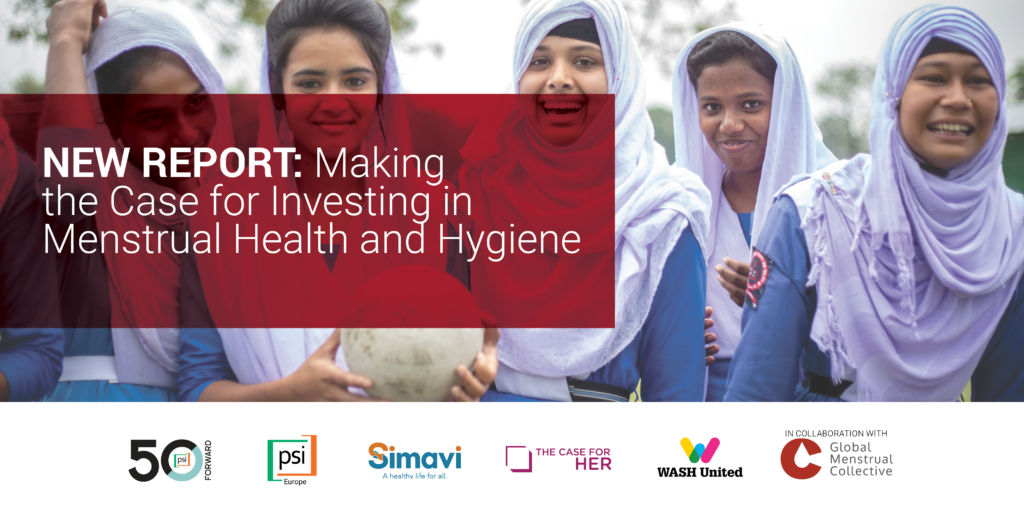Last month, Population Services International (PSI), PSI-Europe, The Case for Her, WASH United, and Simavi, in collaboration with the Global Menstrual Collective, launched a groundbreaking report, Making the Case for Investing in Menstrual Health & Hygiene. Despite the far ranging impacts good menstrual health & hygiene (MHH) can have for women, girls, and all people who menstruate, roughly 500 million menstruators face limitations when it comes to managing their menstruation. Making the Case for Investing in Menstrual Health & Hygiene is a comprehensive guide for both why and how to invest in MHH for the economic, educational, and health benefits of women,girls, and all people who menstruate in low- and middle-income countries around the world.

The report was developed in consultation with government leaders, commercial partners, advocates, funders, and implementing partners over a series of interviews and virtual consultations. Since the launch, we’ve caught up with some of these stakeholders to capture how this new report contributes to their work and how it can be put to action.
By presenting a compelling case for why menstrual health is a critical component of women and girls’ wellbeing and gender equality, it is a call to action for sectors to integrate MHH within their work.
“This report reinforces my belief that investing in Menstrual Hygiene is impactful, in the short and long terms, including health, education and economic benefits. Beyond these impacts it just seems the right thing to do – every girl and woman should be able to manage their menstruation with dignity, without taking risks or being penalised for who they are, and have the opportunity of becoming who they want to be.
– Régis Garandeau, Head of Water, Sanitation & Hygiene, Vitol Foundation
“This report presents a compelling overview of WHY menstrual health and hygiene (MHH) must be a core part of the gender equity agenda. It lays out the complexity of an issue that intersects with many aspects of a woman’s life journey. This is a call to action to all sectors to embed menstrual health within their work and multiply their positive outcomes for women and girls around the world.”
– Laura Amaya & Flynn Lebus, Gender Practice Co-Leads, FSG
The report provides a framework for effective cross-sectoral programming, recognizing that different actors have different priorities and expertise areas. The investment framework can help donors, implementers, and commercial partners identify where they can play a valuable role in the MHH ecosystem.
“SRHR, MHH and WASH are so interconnected that it is sometimes difficult to translate into action because of different understandings, perspectives and prioritizations for investment. The document spelt out the scale and depth thus helpful to understand the concept of MHH and its relation to women’s basic needs, its connection to a healthy reproductive system, and its impact on their health. The learning is useful for advocacy and also to design new projects to realize basic human rights of women.”
– Rokeya Kabir, Executive Director, Bangladesh Nari Progati Sangha
“The significance of the Investment Case is that it gives a mind map to institutions in terms of how they can address MHH matters in their own settings. The proposal to adopt an integrated approach to this is critical because it is a multi-sectoral pursuit which requires a great degree of interface, as well as patience…This Investment Case fills the gap in the elaboration of what is supposed to be a seamless process, especially by governments in addressing provision of free menstrual products to menstruators, age appropriate comprehensive sexuality education, WASH, waste disposal and the broader improvement of lives of women.
– Sipiwo Matshoba, Chief Directorate: Social Empowerment and Participation Department of Women, Youth & Persons with Disabilities in the Presidency, South Africa
It helps funders enter the MHH space and make strategic investments by outlining a clear investment strategy and filling a critical knowledge gap.
“Making the Case for Investing in Menstrual Health & Hygiene will hopefully help more funders enter the menstrual health and hygiene landscape with the confidence to make these critical investments. By expertly outlining the strategy of where and how investments should be directed for the most impact, this report removes the guesswork and uncertainty that contribute to this important area of women’s health being overlooked and underserved.”
– Kajsa Åberg, Managing Director, af Jochnick Foundation
“Placing menstrual health on the global health agenda is a top priority for The Case for Her and one of the most strategic opportunities we’ve identified is the designation of menstrual health focal points within organizations that fund women’s health initiatives. Until then, Making the Case for Investing in Menstrual Health & Hygiene helps fill a critical knowledge gap that will help donor agencies make confident and strategic investments in menstrual health, with or without a menstrual health expert in the ranks.”
– Cristina Ljungberg and Wendy Anderson, Co-Founders, The Case for Her
We encourage you to read the report and share how it contributes to your work and how your institution or organization can put it into action, using this social media toolkit.
This post was co-authored by PSI, PSI Europe, Simavi, WASH United, and The Case for Her
For any inquiries or comments, please contact us:
- Hilda Alberda (hilda.alberda@simavi.nl)
- Odette Hekster (ohekster@psi.org)
- Ina Jurga (ina.jurga@wash-united.org)
- Stephanie Kim (skim@psi.org)

